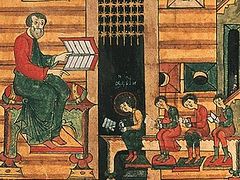Many ask us priests, “What is your opinion on teenagers?” Around 20 years ago I used to teach high school classes, and I was also asked that question. The majority of them want to hear that “the youth of today needs to change, correct themselves, or do something or other.” I cannot say that today’s youth are bad; usually bad people become better.
Some break things, destroy, and curse. These external manifestations that we have noted do not express their souls. It is only an illness. If we look more deeply we will discover that the person has not been able to feel what it means to love, to be kind. The child has not seen the living image of Christ in his parents, teachers, or instructors; after all, if that had happened he would have definitely been touched and received benefit. Children today are after all sincere. We can blame today’s complex times of something, but children are more sincere now than they were before. In order to convince a child of something you have to show proof not only in words but in deeds.
Neither do young people need an authority today. The father may say to the son, “Do as I say, and that’s all. I said so!” No. Today children want dialogue, discussion, they want to understand why they should do it that way and not some other way. When I say for example, “Come to church. You will find joy there,” the child will search whether there really is joy there. And if he comes and I start making nothing but reprimands, he’ll say to me, “Father, why did you call me here?”
When I taught in school, children were my best teachers; they made me think about many things. Children want to look at things objectively: Father talks about humility; but do I have it? I say that you’ll find joy with Christ, but have I felt it? Anxiety, anger, and rage arise, and then I demand that they learn to pray. I talk about how Christ brings peace and tranquility to the soul, but do I have that tranquility?
It seems to me that it’s better to let teenagers be; that is, to pray for them and surround them with love, without too much talk. Our words often bring results contrary to our expectations. We say one thing, and they do the opposite. Usually parents repeat the same thing over and over again without thinking about the consequences. Let the child be. It’s better to show him that you are a happy family, that the Lord makes you joyful—this will be the best sermon.
One young man says to me, “I don’t go to church because I know what they’ll say to me there.” “What?” I ask. “Everything’s forbidden.” “What do you mean?” “It’s forbidden to have fun. Forbidden to spend time with certain people. Forbidden to smoke. It’s a place of bans.” However in fact this does not reflect reality in the Church. But that is the image that we create. Instead of showing how we can rejoice in Christ, we teach them what they can’t do. St. Porphyrios said, “Panic, stress, or worry does not make darkness go away. You hit the light switch and the light turns on. You open the curtains and the sun shines in. Darkness automatically disappears.” We should bring young people to us through love, sympathy, condescension, and complete understanding. Compete understanding does not mean justifying one or another sinful deed, but the awareness of why our children do one thing and not another. And they will definitely understand and feel this.
Do you know why St. Paisios and other ordinary elders attracted so many people to themselves? Because they disposed people toward themselves with something that made an anarchist from Thessalonki write a letter to St. Paisios. He began with the words, “My beloved daddy.” Not knowing how to officially address a monk, he wrote as his heart told him to, because his heart had felt geronda’s love for him.
One day I asked someone with whom I was having a discussion, “Who is your greatest teacher?” Hoping to hear the name of some saint, I heard instead the reply, “My greatest teacher is my sins, misfortunes, and mistakes.” St. Paisios said, “Hardships and adversities are like flying carpets that can bring us to heaven.” Young people who are zealous about correcting there mistakes should be optimistic and know that they are walking the right path and will soon meet with Christ, Who is Light and Love.





In gratitude,
Sara Nassif Herrick